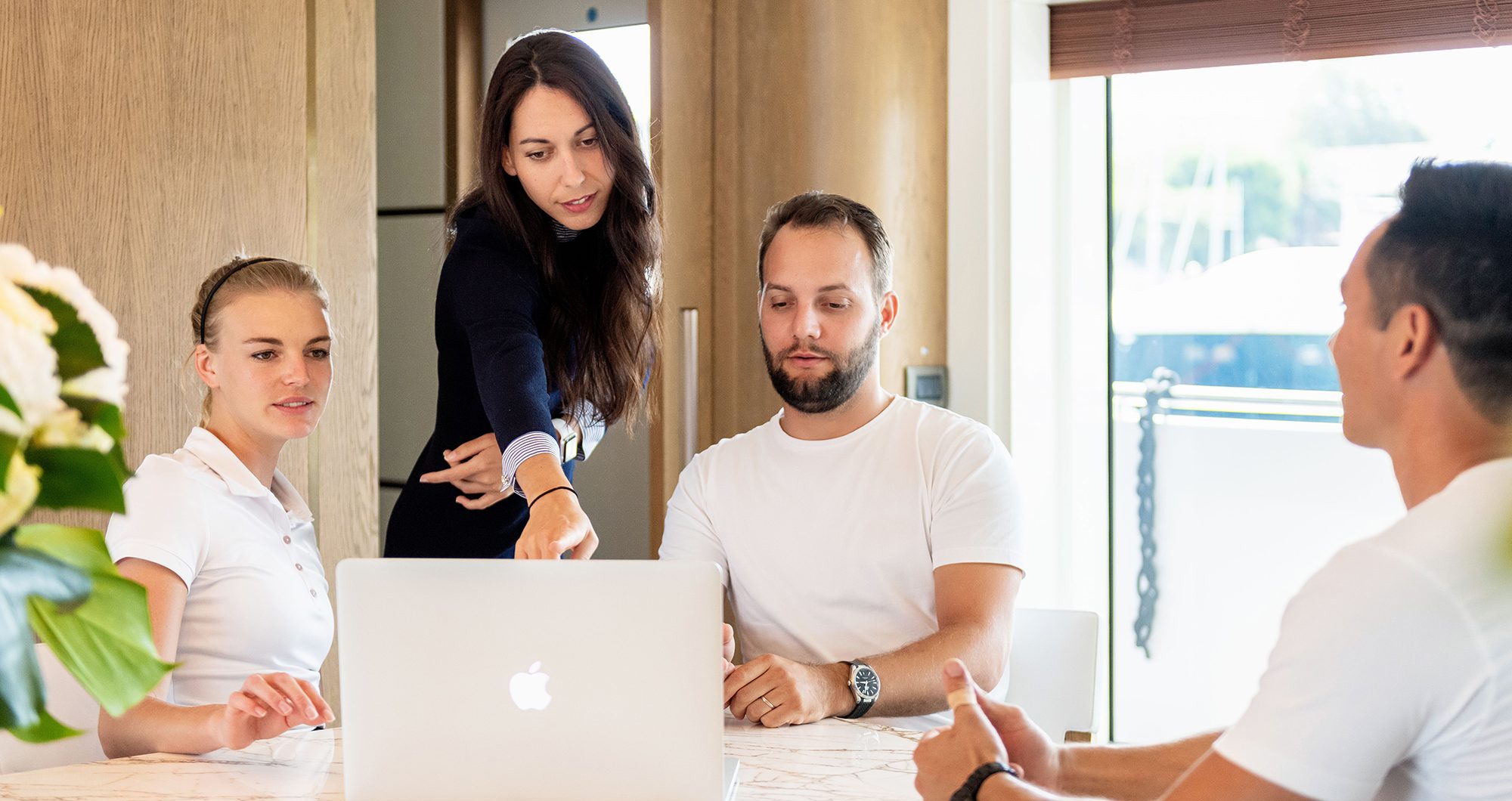Spotlight on….Environmental Training for Yacht Crew

Environmental Training for Yacht Crew, or the ETYC, was set up in 2019 with a vision to make the yachting industry more sustainable. They provide training and mentoring for yacht crews, offering adaptable solutions to that are easily incorporated into day-to-day yacht operations. By focusing on the everyday habits of crew, they hope to inspire a culture change across the yachting industry.
Here they share their journey as part of Clear Ocean Pact’s Spotlight on…. series, bringing attention to the yachting industry’s environmental innovators and pioneers.
Who is ETYC?
ETYC is a Monaco-based company, with a vision to make the yachting industry more environmentally sustainable. We do not focus on technological solutions, but instead on developing adaptable practices that aim to promote more eco-friendly habits and mindsets onboard. We do this by offering training, coaching and audits to yacht crews so that they can actively contribute to reducing their yacht’s impact on the environment. Our methodologies and solutions are designed to be easily adopted onboard with minimal disruption to day-to-day operations.
Behind ETYC, there are two young people with serious environmental concerns:


Claire comes from Guadeloupe, a French Island in the Caribbean, and often says “when you live on an island, you need to live with the nature surrounding you”. After completing her studies in Psychology, she spent more than 6 years in the Yachting Industry as a Chief Stewardess. Shocked by what she saw, she decided to act and create the company.
I, Sebastien, was born in Monaco and love the Mediterranean, but I saw it dramatically changing over the years for the worse. Plastic waste is now everywhere – on our beaches, in our seas, and I decided it was time to act. I participated in the creation of a bulk store concept near Lyon that is now spreading in the region and, in parallel, I worked for five years as a watertoys expert for Yachts. When I met Claire and learned of her project, I knew I had to join her.
Why did you start ETYC?
The idea came from Claire. She initially wanted to change the way things were done onboard the 44m yacht she was working on. She decided to learn the ISO14001 standard which is an international standard to improve ecological performance for businesses. She adapted the methodology for the yachting industry and her own yacht. The benefits were immediate and even the owner started to follow the new rules. The next stage was to share her progress and ideas, and to obtain financial and practical support to move forward.
Claire joined a start-up contest held by the Jeune Chambre Economique de Monaco. I met her during this contest, loved her idea, and was keen to share my skills and experience to help Claire take this further. Together, we managed to win the contest, which allowed us to start the company. ETYC was born.
What are your plans within the industry?
We want to help as many crew members and yachts as possible to develop improved, more sustainable practices onboard. Oceans and seas are our offices. If we do not act now, the yachting industry will quickly decline.
We think that the whole industry needs to move forward, collaborate more and start thinking as one. That is why we are seeking to establish support and partnerships with all the players across the industry: shipyards, agencies, institutions, marinas and much more.
We are hoping this will lead to a community in which everyone can come together to share ideas, tips and stories and to promote new solutions. The idea is to work as one in enhancing the industry’s commitment to sustainability. We are just starting out, but people can show their support by following our Instagram page or Facebook page.
What are your main goals?
One of our key aims is to influence legislations, standards and rules that have an impact on sustainability in yachting. Sustainability must become a key priority for yachting regulations, in order to affect real change. We are already in touch with several institutions in order to achieve this.
Our ultimate dream would be to see a completely balanced eco-strategy, where changes in practices and behaviours come hand in hand with technological improvements and viable alternatives. We believe this is the way to create a yachting industry that lives in harmony with nature rather than one that takes advantage of, and contributes to destroying, it.
What do you think are the biggest barriers to addressing environmental issues in the yachting industry?
There are two criticisms we often hear:
The first one is: “A yacht by itself is already a big source of pollution so my actions onboard are just a drop in the ocean”. We don’t agree with this statement. Indeed, the technologies that drive our yachts are not green yet, but if we do get to the stage where we can have a completely environmentally safe yacht, what would be the point if we still follow bad practices onboard? We often make the same parallel with discount shopping. When we shop and get a 5 or 10% discount, and then another one, and then another – those savings add up. The logic is the same for the eco-yachting agenda: small actions add up and, in the end, they have a significant impact.
The second critique we hear is about the yacht owner: “My boss doesn’t care”, “my boss wants this…”, and so on. We think that improving a yacht’s environmental footprint is a collective effort, and it is also part of the crew’s job to increase awareness among the owner and guests. People are often resistant to change, but they are more likely to listen and change their habits when they are offered practical and achievable solutions.
Finally, the whole process of becoming “greener” looks huge, but you need to take it step by step. Each step is a small victory that leads to a successful path. We can’t be perfect and there will always be things that we can do better. Still, we can do our best, acknowledging that we have different personal and professional constraints.
What does your course entail and how do people sign up?
The ETYC training is a two-day training course held at La Belle Classe Academy, the training centre of the Yacht Club de Monaco, but it can be done from anywhere, even onboard! The training covers all areas including engineering, galley, interior, etc., and it is divided into two parts.
The first part explores evidence-based practice, presenting key environmental knowledge, facts and data about current environmental challenges and how our industry contributes to this.
The second part focuses on adapting methodologies and solutions that can be used onboard. We present the ETYC Environmental Management System, based on the ISO14001 standard I mentioned earlier, demonstrated with different exercises. At the end of the course, the trainee will be able to use and adapt the methodology onboard. The price of the complete training is 800€ per person.
The other service that ETYC offers is audit and coaching. We come onboard, we offer training to the crew and we review the current practices, habits and constraints of the yacht, to build a tailored solution. This is the easiest way to ensure the best results onboard. At the end, the yacht gets the ETYC Label, certifying that the yacht is doing its best to limit its ecological impact.
What are the other benefits?
Alongside the environmental benefits, crew will also gain space, time and budget. Indirectly, they can offer a better service to the guests and the owner. Let’s take a very basic example: replacing plastic straws and plastic bottles with inox or bamboo straws and flasks. You buy them once, you offer an elegant solution to the guests, you save space as you do not need a lot of stock, and you have less waste to manage, which saves time, effort and storage.
It is also a good way to promote your yacht with management and brokers – getting the ETYC label helps to ensure that your yacht stands out among clients, especially as people are becoming much more ecologically aware.
Everyone, crew, owners and guests, can also feel proud that they are part of something worthwhile – a more sustainable yachting industry.
Last parting piece of advice, if you could give five tips on how a yacht can reduce their environmental footprint, what would they be?
There are many simple and rapid solutions, but if I had to pick five, I would recommend:
- Replacing plastic straws with inox straws. You produce less single-use plastic waste, which is one of the biggest threats to our oceans, as well as saving space and money
- Using Bee wrap instead of plastic film. It is made of a cloth and beeswax and does the same job of protecting your food as plastic film
- Using adapted sunscreen. This one is very important for marine wildlife and especially corals. Only use sunscreen which has the ocean protection logo. An estimate 25000t of sunscreen applied on the skin ends up in our oceans each year
- Replacing your coffee machine with moka or grain. If you can’t change your machine, use reusable capsules, but speaking from experience, the grain coffee machine will give the best results: it’s cheaper, better quality, offers a wider selection and needs less storage
- Changing your cleaning products and toiletries. Most of our regular cleaning products like soap, toothpaste and laundry detergent finish up in the oceans. Buying specific eco-friendly products is a small change that makes a huge difference
Learn more about ETYC by visiting their website at https://www.etyc.fr/, their Instagram page etycyacht or Facebook page @etycyacht.
Do you have an eco-message, story or idea you want to share? Or have you signed up to our PACT and want to tell us about your journey so far? Then we want to hear from you! Please contact our Communications Manager Kailey Nolan.
